- Coastal Bend College is a comprehensive, public community college serving a diverse South Texas area. It is a student-centered institution committed to the highest integrity and to the development of an educational culture that supports creativity, encourages professional development, and promotes excellence in all areas.
School Highlights
Coastal Bend College serves 5,091 students (18% of students are full-time).
The college's student:teacher ratio of 19:1 is lower than the state community college average of 23:1.
Minority enrollment is 83% of the student body (majority Hispanic), which is more than the state average of 74%.
Quick Stats (2025)
- Enrollment: 5,091 students
- In-state tuition: $4,506
- Out-state tuition: $4,956
- Student:teacher ratio: 19:1
- Minority enrollment: 83%
- Source: Integrated Postsecondary Education Data System (IPEDS)
Top Rankings
Coastal Bend College ranks among the top 20% of public schools in Texas for:
Category
Attribute
School Resources
School Overview
The teacher population of 262 teachers has stayed relatively flat over five years.
Coastal Bend College
(TX) Community College Avg.
Carnegie Classification
Associate's Colleges: High Career & Technical-High Nontraditional
Baccalaureate/Associate's Colleges: Associate's Dominant
Institution Level
At least 2 but less than 4 years
At least 2 but less than 4 years
Institution Control
Public
Private, for profit
Total Faculty
262 staff
262 staff

School Calendar
Student Body
The student population of Coastal Bend College has grown by 132% over five years.
The student:teacher ratio of 19:1 has increased from 16:1 over five years.
The Coastal Bend College diversity score of 0.36 is less than the state average of 0.70. The school's diversity has declined by 8% over five years.
Total Enrollment
5,091 students
1,396 students
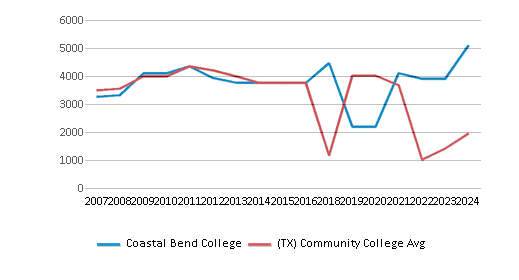
Student : Teacher Ratio
19:1
23:1
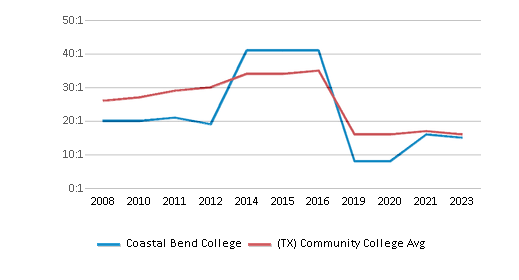
# Full-Time Students
919 students
890 students
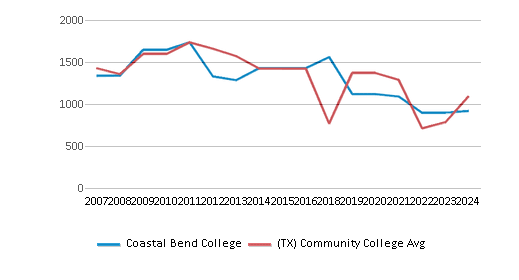
# Part-Time Students
4,172 students
4,022 students
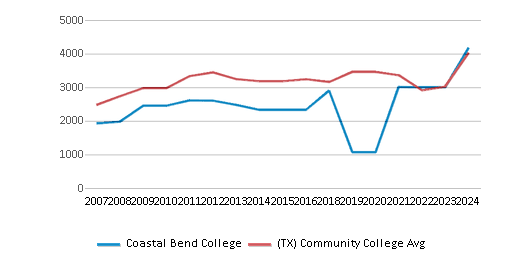
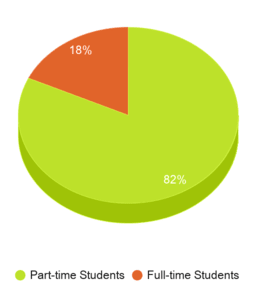
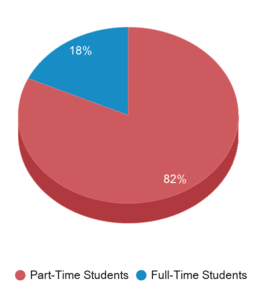
# Enrollment Undergraduate
509 students
403 students
# Full-Time Undergraduate Students
919 students
890 students
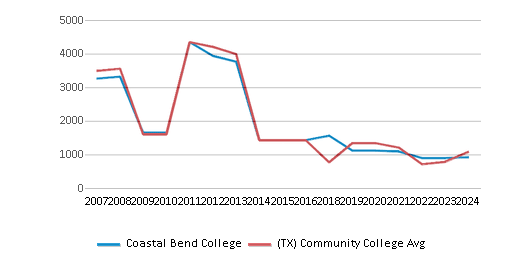
# Full-Time Graduate Students
n/a
40 students
# Part-Time Undergraduate Students
4,172 students
4,022 students
# Part-Time Graduate Students
n/a
47 students
Total Dormitory Capacity
172 students
252 students
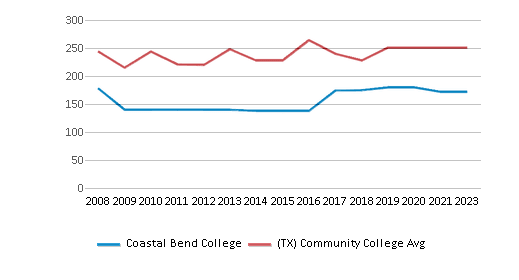
% American Indian/Alaskan
n/a
n/a
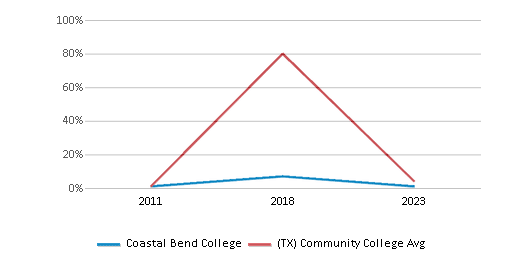
% Asian
1%
6%
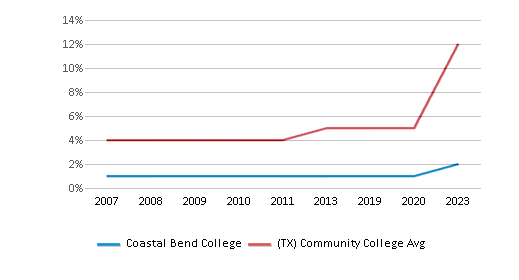
% Hispanic
78%
46%
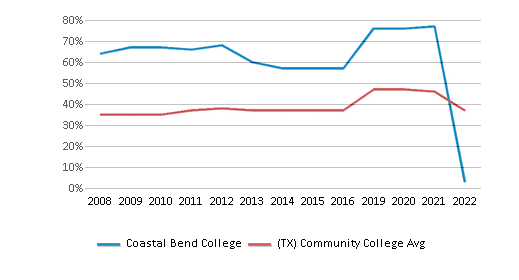
% Black
2%
14%
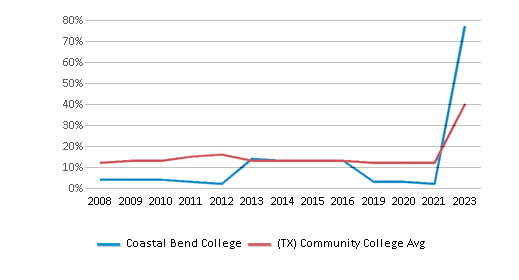
% White
17%
26%
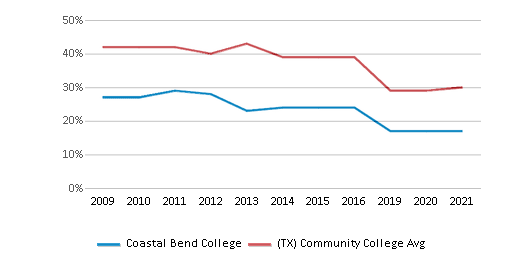
% Hawaiian
n/a
n/a
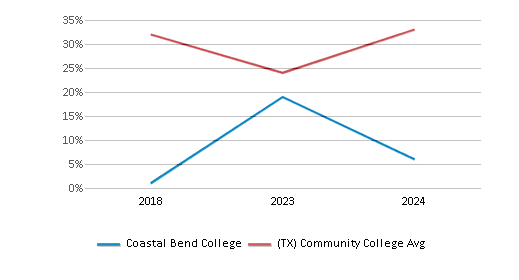
% Two or more races
n/a
3%
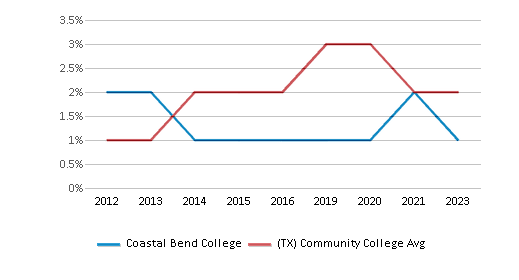
% Non Resident races
n/a
2%
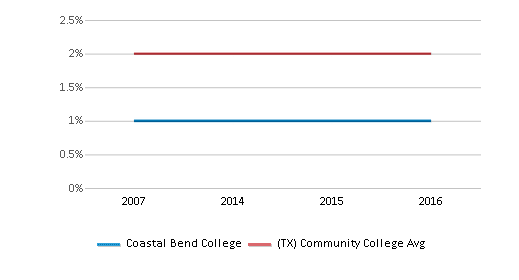
% Unknown races
2%
3%
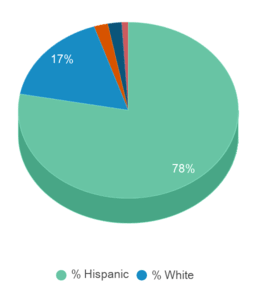
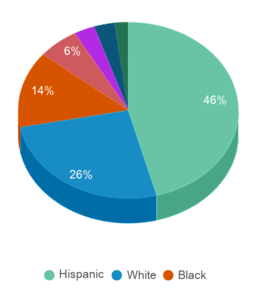
Diversity Score
0.36
0.70
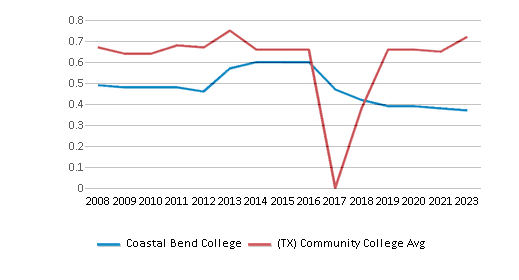
College Completion Rate (Students who graduate in less than 4 years)
0.2191%
0.5469%
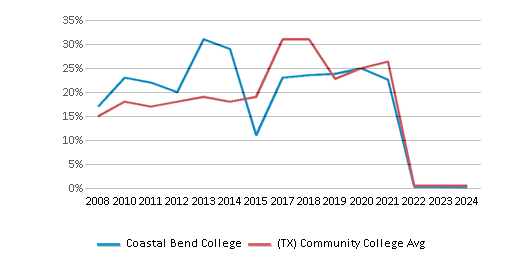
College Completion Rate (Students who graduate in 4 years or more than 4 years)
n/a
0.3357%
Average Graduate Earnings (10 Years)
$32,600
$34,600
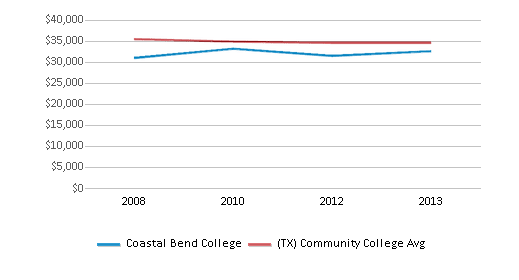
Tuition and Acceptance Rate
The public in-state tuition of $4,506 is more than the state average of $3,316. The in-state tuition has stayed relatively flat over four years.
The public out-state tuition of $4,956 is less than the state average of $5,750. The out-state tuition has stayed relatively flat over four years.
In-State Tuition Fees
$4,506
$3,316
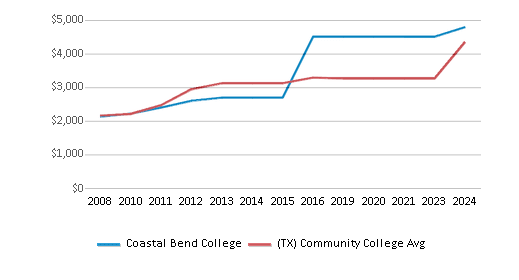
Out-State Tuition Fees
$4,956
$5,750
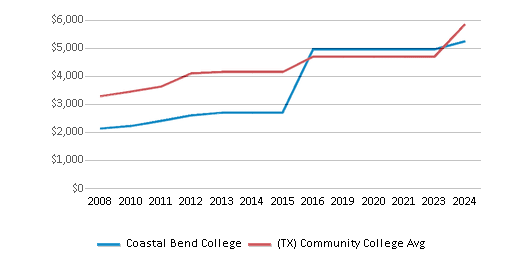
% Students Receiving Some Financial Aid
97%
84%
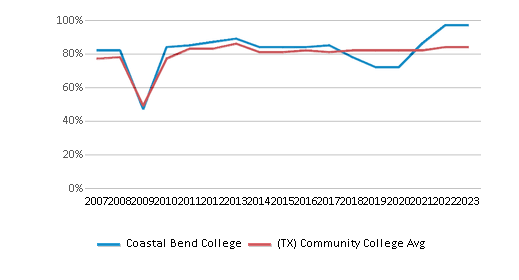
Median Debt for Graduates
$6,500
$6,536
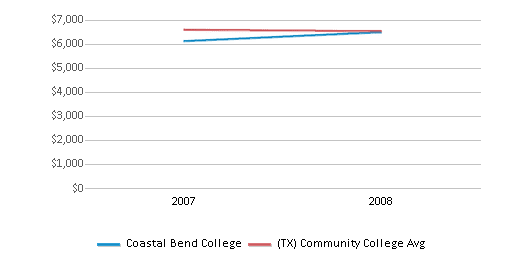
Median Debt for Dropouts
$7,500
$5,500
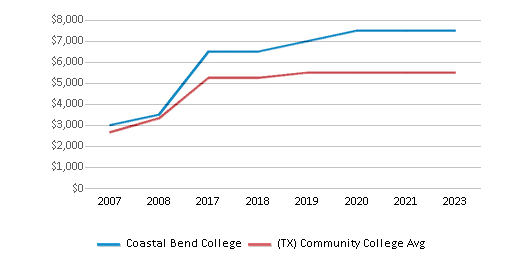
Acceptance Rate
n/a
81%
Source: 2024 (or latest year available) Integrated Postsecondary Education Data System (IPEDS) , School Administrators
School Notes
- Coastal Bend College is a two year community college with an open door policy. The district was created in 1965 and opened in 1967 with 790 students. The main campus is located in Beeville, Texas with centers in Alice, Kingsville, and Pleasanton. The total enrollment for Fall 2004 was 4,016. Coastal Bend College-Beeville's modern computerized campus is second to none. Located at 3800 Charco Road, the facility serves the educational needs of more than 1,300 students. State-of-the-art training is offered in occupational programs such as accounting, air conditioning and refrigeration, child development, computer information technology, cosmetology, dental hygiene, drafting and design technology, electronic servicing, emergency medical service, general office management, health information technology, law enforcement, office automation technology, vocational nursing, and welding. The campus also offers hundreds of academic courses which are transferable to most four-year institutions. Coastal Bend College offers the Associate in Arts Degree; the Associate in Science Degree; the Associate in Applied Science Degree, and Certificates of Achievement in specialized technical and occupational fields. Coastal Bend College is accredited by the Commission on Colleges of the Southern Association of Colleges and Schools.
Frequently Asked Questions
How much does Coastal Bend College cost?
Coastal Bend College's tuition is approximately $4,506 for In-State students and $4,956 for Out-State students.
What schools are Coastal Bend College often compared to?
Coastal Bend Collegeis often viewed alongside schools like Del Mar College by visitors of our site.
What is Coastal Bend College's ranking?
Coastal Bend College ranks among the top 20% of community college in Texas for: Percent of students receiving financial aid.
Recent Articles

Obtaining Your Bachelor's Degree at a Community College
Explore the evolving landscape of community colleges offering bachelor's degrees, addressing affordability, accessibility, and workforce needs.

A to Z of Community College Certificates and Courses
From business and healthcare to technology and skilled trades, the article showcases the breadth of options available to students seeking to enhance their knowledge, develop new skills, or pursue career advancement.

What is a Community College?
This comprehensive guide explains what a community college is, its history, and its role in higher education. It covers the types of programs offered, differences from four-year colleges, benefits of attending, and important considerations for prospective students, providing valuable insights for those exploring educational options.









